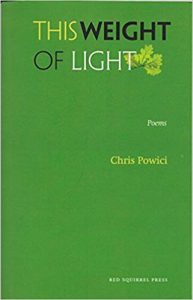This Weight of Light
 Chris Powici is a champion of Scotland’s poetry scene, being a generous contributor to that community, not least through his free, and highly respected Northwords Now magazine. This Weight of Light is his latest work and second collection. Its concern for the natural world is not too dissimilar to that of a number of his contemporaries such as John Burnside and Kathleen Jamie. Like them, he writes and seeks a greater understanding of the boundaries between the human and non-human. But where Burnside’s poetics shift more toward the social and political – consider All One Breath – Powici distinguishes his poetics by writing his reverence for the epiphanic moment. Where Burnside has a prominent, binding ecological thread, Powici is much more rooted in the phenomenological. His poems glimpse the natural, considering them in depth through immediate sensory responses. Those images crystallise as the volume progresses.
Chris Powici is a champion of Scotland’s poetry scene, being a generous contributor to that community, not least through his free, and highly respected Northwords Now magazine. This Weight of Light is his latest work and second collection. Its concern for the natural world is not too dissimilar to that of a number of his contemporaries such as John Burnside and Kathleen Jamie. Like them, he writes and seeks a greater understanding of the boundaries between the human and non-human. But where Burnside’s poetics shift more toward the social and political – consider All One Breath – Powici distinguishes his poetics by writing his reverence for the epiphanic moment. Where Burnside has a prominent, binding ecological thread, Powici is much more rooted in the phenomenological. His poems glimpse the natural, considering them in depth through immediate sensory responses. Those images crystallise as the volume progresses.
In his attentive observations, its clear that Powici relishes simplicity. Chance encounters are given importance but not in ways that might alienate readers. “The Otter Goddess” places that animal in a heightened, religious position. The poem opens, “The otter goddess won’t hear our prayers”, immediately suggesting a failure in communication between human and animal. The poem remains largely observatory, congruent with the lyric mode; an almost childlike awe is articulated by an experienced voice:
All she knows is grace –
Cool thrill of tail-flick and fur-glitter
as she surges up the green depths
to sashay on the swell.
In very few words, Powici’s verse exercises a wonderful play with language. This example establishes the micro-looking that is evident throughout, the ability to be patient, and revel in the world’s infinite and yet minute beauty. Read aloud – the “sh” sounds and hyphenated words slow the reader, demand that you too take your time to consider.
The poems do not form an overtly threaded narrative, but by the time “May Bike Ride” is reached, there is an implicit understanding that all the chance encounters Powici explores might too easily have passed by unnoticed. That cyclist could well have been “screaming down the coast”. He points out “all this gorse-bright earth” in “The Hare” and opens the experience of feeling and seeing,
Earth on the verge of becoming water
earth you could drown in.
These encounters are only possible if you stop and observe. “Cows At Night”, like many of these poems, is unpunctuated, reading as an elevated, unfinished thought:
And loose mists of breath rise
halfway the height
of the whitethorn hedge
then hang drift
making and unmaking the world[.]
These poems demonstrate a sensory immersion with a precious world that is to Powici too often relegated to the peripheral and easily missed. Consider his use of spacing and enjambment – a visual tracing of the poem’s sense, and a subtle direction to the reader.
Despite the observational quality of his work, it would do Powici a disservice to describe his collection as doing only this. There are moments of personal reflection which work to magnify the futility of our human life. “Night Fishing” is written in memory of his brother, Les, and reflects on their shared fishing trips. The poet is haunted by the image of his brother’s shadow in “that ridiculously big angler’s umbrella”. “Fires” closes the collection, noting a telephone call between the two about the pastime that allowed them to remain close.
This collection’s title, This Weight of Light, and Powici’s previous volume, Somehow This Earth, hint at an almost perpetual wonder at the surrounding world. For an enterprise so large, the poet exercises a deft hand. That very enormity and its jewel-like seconds, so easily missed by most, are written in lines which reach us in a seemingly effortless state, belying their careful crafting. Powici’s writing is accessible, resonant read aloud; more importantly, This Weight of Light is a collection that is enjoyable and rewarding, and that one that merits repeated reading.
Robert Middlemiss
Ed: You can watch a video of Kirsty Gunn in conversation with Chris Powici, and Powici reading from his new collection on these pages.

Leave a Reply